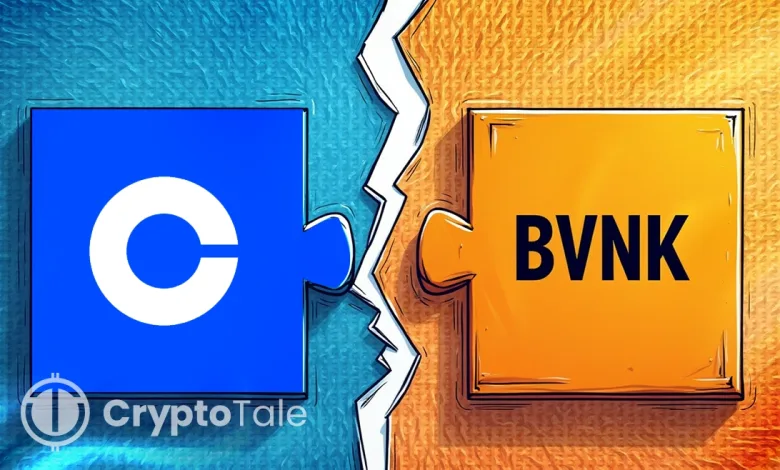Coinbase Backs Off $2 Billion BVNK Deal Amid Strategy Change

- Coinbase ends $2B BVNK deal, reflecting growing caution in stablecoin expansion.
- The BVNK remains a major stablecoin payments firm, processing $20 billion annually.
- The stablecoin merger activity continues as Mastercard and Stripe pursue new deals.
Coinbase has cancelled its planned $2 billion acquisition of UK-based stablecoin infrastructure firm BVNK, a decision reached after due diligence discussions concluded on November 11. The move, agreed upon by both firms, is one of the largest stopped transactions in the digital payments sector.
Regulatory Uncertainty Forces Strategic Pause
The decision comes as regulators in the U.S. and Europe tighten oversight on stablecoin issuance, custody, and cross-border payment systems. Coinbase’s move from the BVNK deal shows the growing caution among exchanges.
The proposed acquisition, which would have been Coinbase’s second-largest after its $2.9 billion purchase of Deribit, was expected to strengthen its position in the stablecoin payments market.
However, the changing regulatory environment, together with liquidity tightening, may have prompted Coinbase to preserve capital ahead of potential U.S. stablecoin legislation. The GENIUS Act, passed in July, and ongoing Treasury assessments have intensified compliance requirements for firms expanding in this sector. In this context, Coinbase’s decision appears less a retreat and more a reassessment of its expansion strategy.
BVNK’s Role in Global Payments
Founded in 2021 by Jesse Hemson-Struthers, Donald Jackson, and Chris Harmse, BVNK has quickly become a key player in stablecoin infrastructure. The London-based startup enables companies to integrate blockchain-based payments into traditional systems and now processes more than $20 billion in annualized transaction volume.
BVNK previously raised $50 million in December 2023 at a $750 million valuation, with backing from Visa and Citi Ventures. Mastercard and Stripe were also exploring acquisitions in the same space.
Mastercard is reportedly negotiating a potential $2 billion deal for Zerohash and Stripe, securing stablecoin firm Bridge for $1.1 billion. Despite Coinbase’s exit, BVNK’s operations continue independently with ongoing partnerships and interest from institutional investors seeking exposure to the stablecoin payments sector.
Strategic Restraint Replaces Expansion Drive
Coinbase’s decision to cancel its deal with BVNK marks a shift from its earlier habit of buying up other companies. Earlier this year, it made several big purchases, including spending $375 million to buy the token sale platform Echo and its Sonar product.
Those moves showed Coinbase’s strong push to expand into areas like crypto derivatives and advanced financial tools. But now, the company seems to be taking a more careful approach with large deals.
In the last quarter, Coinbase made about $246 million from stablecoin-related activities, which is roughly 20% of its total $1.9 billion revenue. While buying BVNK could have boosted that figure, walking away from the deal gives Coinbase a chance to focus its money on smaller, more strategic projects or to build its own payment systems.
This reflects a wider slowdown in crypto company takeovers, as firms reassess the risks of big international deals and tighter regulations after the boom years of 2021.
Related: Coinbase Rolls Out UK Savings Account Offering 3.75%: Report
Market Readjusts as Stablecoin Deals Continue
Even as Coinbase steps back, stablecoin-related mergers remain active. Mastercard’s ongoing talks with Zerohash and Stripe’s completion of its Bridge acquisition show the sector’s continued appeal.
Notably, global financial networks such as Western Union, MoneyGram, and SWIFT are integrating stablecoin-based payment solutions, showing the broader institutionalization of the sector.
However, the BVNK development shows that even well-capitalized firms are weighing regulatory clarity over fast expansion. Coinbase’s move suggests that leading exchanges are focusing on risk management, liquidity preservation, and strategic flexibility amid tightening compliance standards across major markets.
Coinbase’s decision to end the $2 billion BVNK acquisition is a broader recalibration within the crypto industry. The move shows how exchanges are adapting to stricter regulatory scrutiny, changing from aggressive growth toward prudent capital allocation. As stablecoin oversight grows, Coinbase’s strategic restraint indicates the sector’s transition from fast expansion to measured, compliance-driven development.




